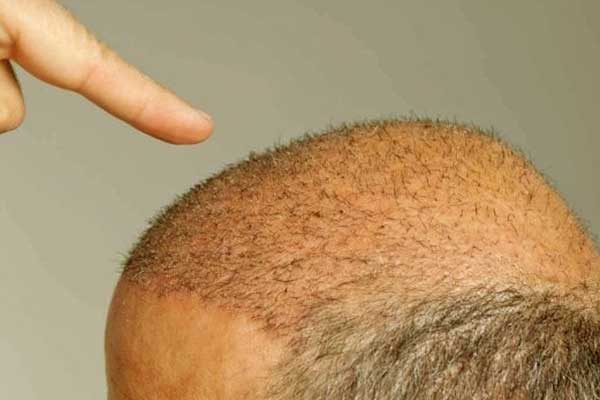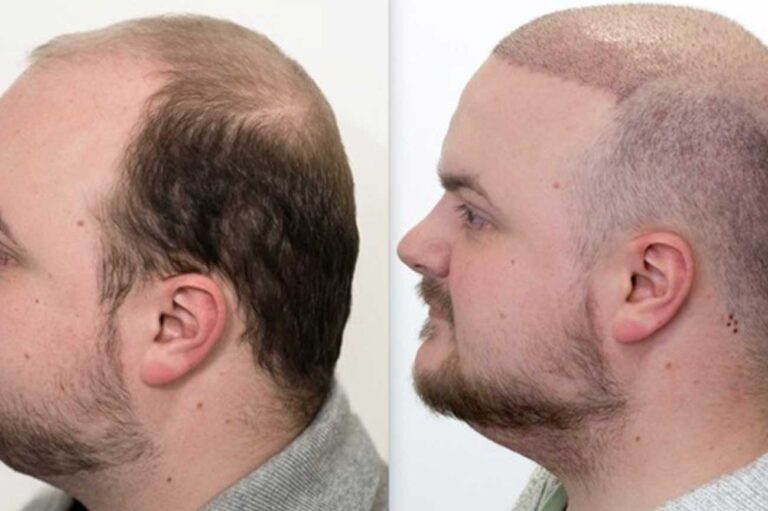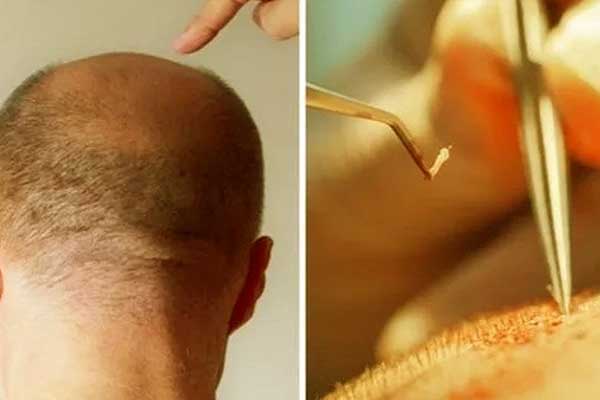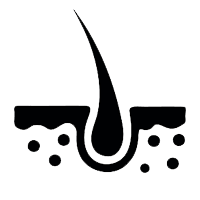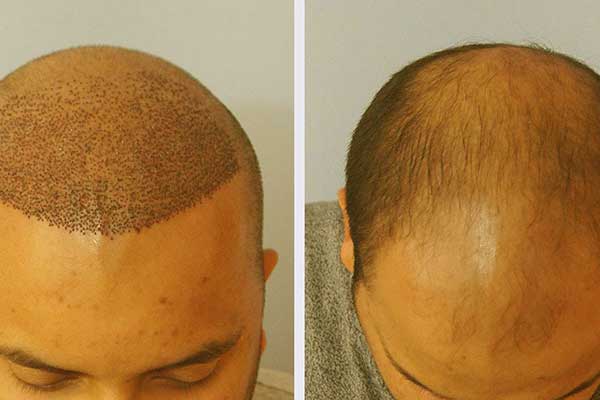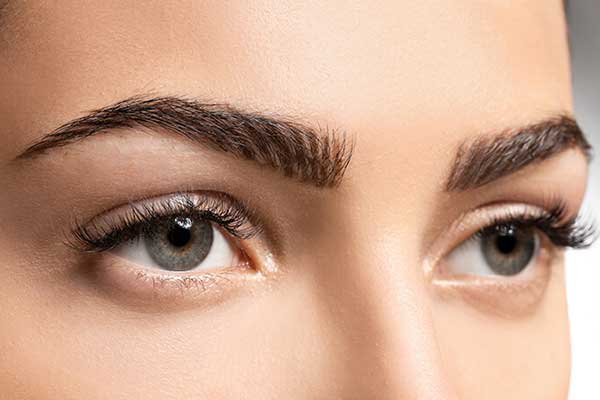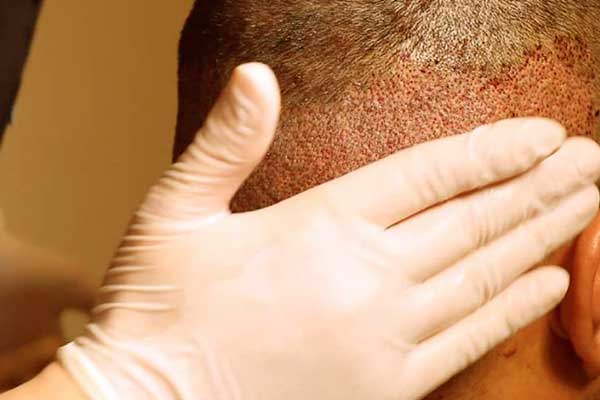HIV Hair Transplant in Turkey: Comprehensive Guide
Safe, effective, and specialized hair restoration options for HIV positive patients
Understanding HIV Hair Transplant
Hair loss can affect anyone, including individuals living with HIV. Many HIV-positive patients experience hair loss due to multiple factors, including the side effects of antiretroviral medications, stress, or the impact of the virus itself on the body’s immune system. For years, hair transplant options for HIV-positive individuals were limited due to safety concerns, but medical advancements have now made it possible for people living with HIV to safely undergo hair transplantation procedures.
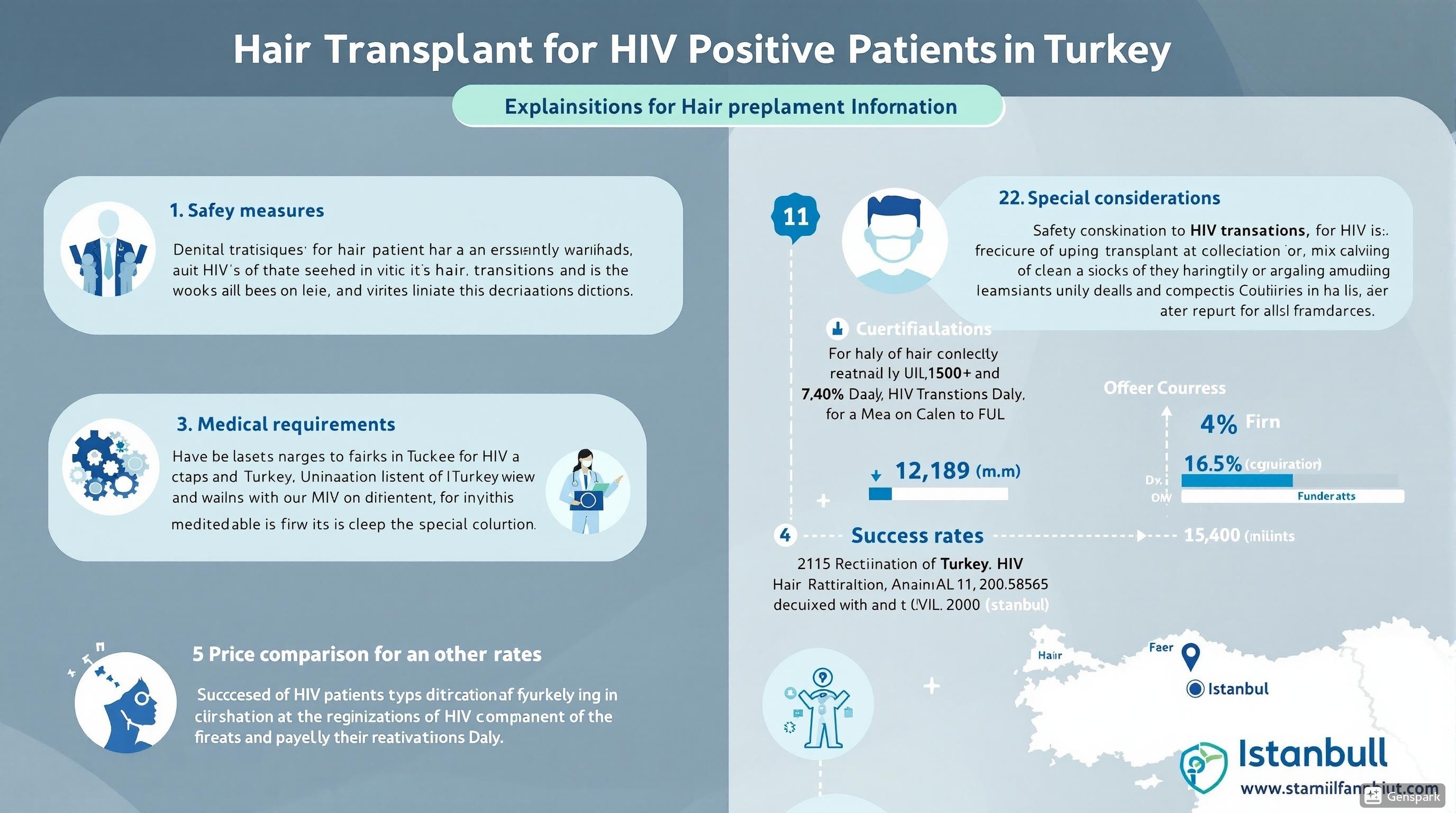
Infographic: Hair Transplant for HIV Positive Patients in Turkey
Turkey has emerged as a leading destination for HIV-positive individuals seeking hair transplantation, offering specialized clinics that combine advanced medical protocols, experienced surgeons, and cost-effective treatment options. At Lovi Clinic, we understand the unique needs of HIV-positive patients and provide comprehensive hair restoration services in a safe, controlled environment.
Is Hair Transplant Safe for HIV Positive Patients?
Yes, when performed by specialized medical professionals in properly equipped facilities, hair transplantation is safe for HIV-positive individuals. The key factors are:
- The patient’s general health status and HIV viral load
- Special sterilization protocols and dedicated operating rooms
- Experienced medical teams trained in treating HIV-positive patients
- Appropriate pre-operative testing and evaluation
Medical Requirements and Considerations
Before undergoing a hair transplant procedure, HIV-positive patients must meet certain medical requirements to ensure their safety and maximize the chance of successful results.
Essential Pre-Surgery Medical Requirements
- Controlled Viral Load: Patients should have a stable, well-controlled HIV status with undetectable viral loads, typically achieved through consistent antiretroviral therapy.
- CD4 Count: A CD4 count above 200 cells/mm³ is generally considered safe for surgical procedures.
- General Health Assessment: Good overall health with no active opportunistic infections or major health complications.
- Medication Stability: Patients should be on a stable antiretroviral regimen for at least 6 months prior to the procedure.
- Complete Blood Count: Normal or near-normal blood parameters, including hemoglobin, white blood cells, and platelets.
- Liver and Kidney Function Tests: These should be within normal ranges to ensure the body can properly process medications used during and after the procedure.

Hair transplantation being performed with enhanced safety protocols for HIV-positive patients
Special Considerations for HIV Positive Patients
HIV-positive patients require additional considerations during hair transplantation to ensure optimal results and minimize risks:
Enhanced Sterilization
Special sterilization protocols are implemented, and dedicated operating rooms are used to prevent any risk of contamination.
Specialized Medical Team
The procedure is performed by surgeons and medical staff with specific training in treating HIV-positive patients.
Medication Management
Careful consideration of potential drug interactions between antiretroviral medications and anesthetics or post-operative medications.
Immune System Monitoring
Close monitoring of immune system function before, during, and after the procedure to minimize infection risks.
Hair Transplant Techniques for HIV Positive Patients
Different hair transplant techniques offer varying benefits for HIV-positive patients. The choice of technique depends on the patient’s specific health status, hair loss pattern, and desired results.
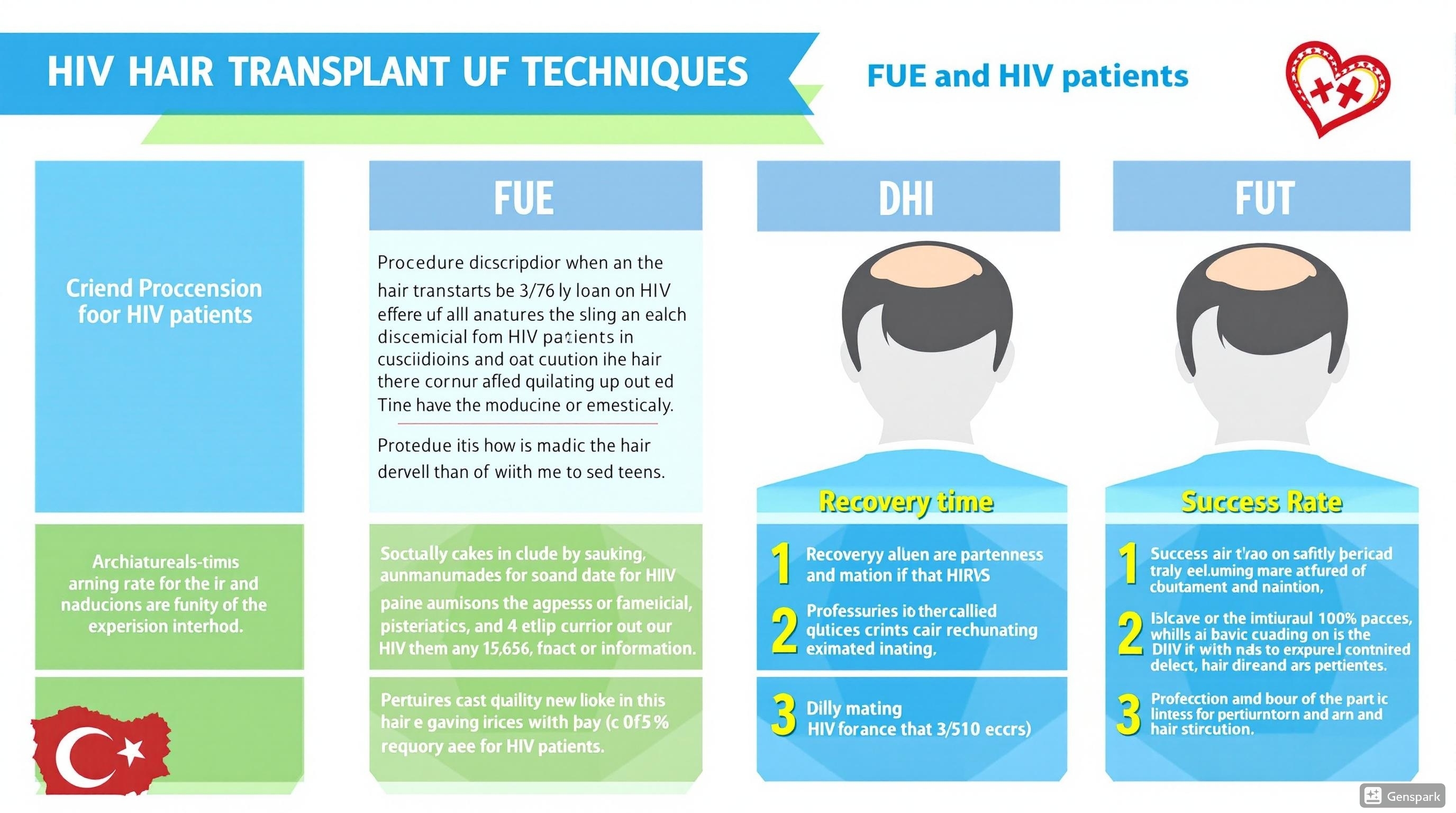
Comparison of Hair Transplant Techniques: FUE, DHI, and FUT for HIV-positive patients
FUE (Follicular Unit Extraction)
Description: Individual hair follicles are extracted from the donor area using specialized micro-punches and then implanted into the recipient area.
Suitability for HIV patients: Highly suitable due to minimal invasiveness and reduced bleeding risk.
Recovery time: 7-10 days
Success rate: 95-98% graft survival rate
DHI (Direct Hair Implantation)
Description: Hair follicles are extracted and directly implanted using a special Choi pen device without the need for pre-made channels.
Suitability for HIV patients: Excellent option due to minimal tissue trauma and precise implantation.
Recovery time: 5-7 days
Success rate: 97-99% graft survival rate
FUT (Follicular Unit Transplantation)
Description: A strip of scalp tissue is removed from the donor area, dissected into individual follicular units, and then implanted.
Suitability for HIV patients: Generally not recommended due to higher risk of bleeding and longer healing time.
Recovery time: 14-21 days
Success rate: 85-95% graft survival rate
Not typically recommended for HIV-positive patients
Recommended Technique for HIV Positive Patients
For most HIV-positive patients, the Sapphire FUE technique or DHI method is recommended due to:
- Minimal invasiveness and reduced bleeding
- Lower risk of infection
- Faster healing time
- Reduced tissue trauma
- Individual extraction and implantation of follicles with no strip harvesting
These techniques allow for precise control during the procedure and minimize the risks associated with more invasive methods like FUT.
Results and Expected Outcomes
HIV-positive patients can expect excellent results from hair transplantation when performed by experienced specialists in a properly equipped facility. The timeline for results is similar to that of HIV-negative patients.
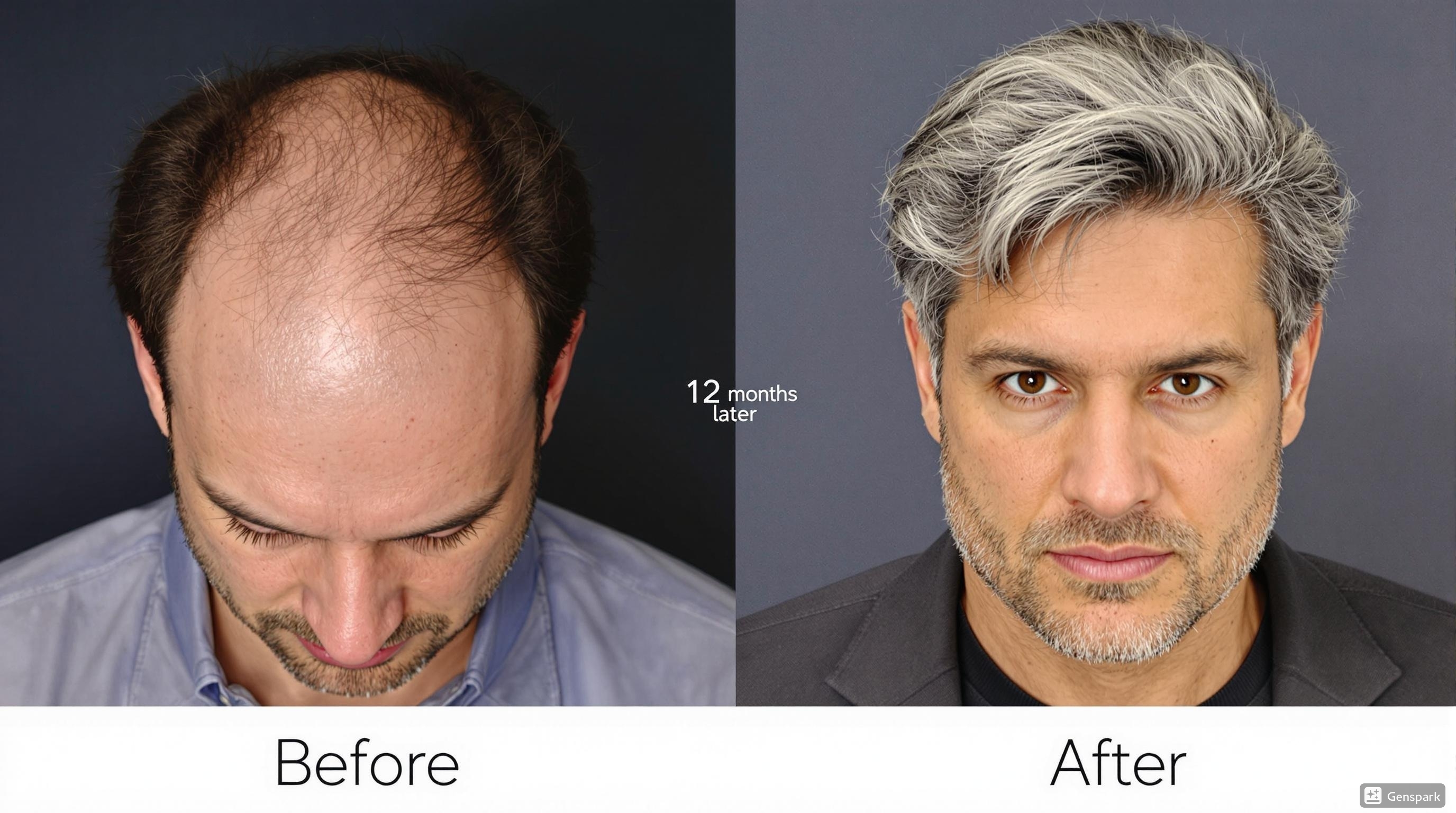
Before and After: 12 months post-hair transplant results
Timeline for Hair Growth After Transplantation
| Time Period | Expected Progress | What to Expect |
|---|---|---|
| 1-2 Weeks | Initial Healing | Scabs form and fall off; redness and swelling subside |
| 2-4 Weeks | Shedding Phase | Transplanted hair falls out (normal part of the process) |
| 3-4 Months | Early Growth | First new hair growth begins, often thin and colorless |
| 6-9 Months | Significant Growth | 60-70% of final results visible; hair thickens and darkens |
| 12-18 Months | Final Results | Complete growth with full density and natural appearance |
Success Rates for HIV Positive Patients
When properly performed, hair transplantation for HIV-positive patients has success rates comparable to those for HIV-negative patients:
- FUE technique: 90-95% success rate
- DHI technique: 95-98% success rate
- Long-term graft survival: 85-90% after 10 years
“I was initially concerned about having a hair transplant as an HIV-positive person, but the team at Lovi Clinic made me feel comfortable and safe throughout the entire process. The results have been amazing and have genuinely changed my life. Not only do I look younger, but my confidence has completely returned.”
Cost and Pricing in Turkey
Turkey has become a leading destination for hair transplantation, offering high-quality procedures at significantly lower costs compared to Western countries. This cost advantage extends to specialized procedures for HIV-positive patients as well.
Hair Transplant Pricing for HIV Positive Patients
| Country | FUE (USD) | DHI (USD) | Notes |
|---|---|---|---|
| Turkey | $3,000 – $3,500 | $3,500 – $4,500 | Specialized clinics for HIV patients; all-inclusive packages |
| United States | $12,000 – $16,000 | $15,000 – $20,000 | Limited options for HIV patients; high premium costs |
| United Kingdom | $9,000 – $13,000 | $12,000 – $17,000 | Few specialized clinics; long waiting times |
| Germany | $8,000 – $12,000 | $10,000 – $15,000 | Good medical standards but limited HIV-specific experience |
| Canada | $10,000 – $14,000 | $12,000 – $18,000 | High-quality care but premium pricing |
What’s Included in Turkish Hair Transplant Packages
At Lovi Clinic, our all-inclusive packages for HIV-positive patients typically include:
Medical Services
- Pre-operative consultation and assessment
- Specialized blood tests for HIV-positive patients
- Hair transplantation procedure (FUE or DHI)
- Medications (pain relief, antibiotics, anti-inflammatory)
- Special sterilization and safety protocols
- Post-operative care kit with specialized products
- Follow-up consultations (in-person or virtual)
Accommodation & Travel
- Hotel accommodation (typically 3-4 nights)
- Airport-hotel-clinic transfers
- Translation services throughout your stay
- City tour (optional)
- Personal coordinator throughout your treatment
- SIM card with local data (optional)
- Private transportation with confidentiality
Why Choose Turkey for HIV Hair Transplantation
Turkey has established itself as a global leader in hair transplantation, with special advantages for HIV-positive patients seeking these procedures.
Specialized Expertise
Turkish clinics have developed specialized protocols and expertise in performing hair transplants for HIV-positive patients, with trained medical teams.
Advanced Facilities
State-of-the-art clinics with dedicated operating rooms specifically designed for HIV-positive patients, ensuring maximum safety.
Cost-Effective Treatment
Significantly lower prices than Western countries without compromising on quality, making specialized treatment accessible.
Comprehensive Care
All-inclusive packages that handle everything from accommodation to transportation, reducing stress for patients.
Privacy and Confidentiality
Turkish clinics prioritize patient privacy, with strict confidentiality protocols especially important for HIV-positive patients.
Medical Tourism Infrastructure
Well-established medical tourism ecosystem with services specifically designed for international patients.
“After being turned down by clinics in my home country, I discovered the option of having my hair transplant in Turkey. The level of care, expertise, and understanding I received as an HIV-positive patient was outstanding. The clinic had specific protocols in place, and I felt safe throughout the entire process. The results have been fantastic, and I saved over 70% compared to prices back home.”
Frequently Asked Questions
Yes, HIV-positive individuals can safely undergo hair transplantation when the procedure is performed by specialized medical professionals in properly equipped facilities. The key requirements include having a controlled viral load, good overall health, and a strong immune system (typically with CD4 counts above 200 cells/mm³). Modern hair transplant techniques like FUE and DHI are minimally invasive and can be safely performed with proper precautions.
Hair transplantation for HIV-positive patients in Turkey typically costs between $3,000 and $4,500, depending on the technique used (FUE or DHI) and the number of grafts required. This is significantly more affordable than Western countries, where the same procedures can cost $10,000-$20,000. The higher cost compared to standard hair transplants reflects the specialized environment, additional safety protocols, and specialized medical team required for HIV-positive patients.
Yes, it is essential to disclose your HIV status before undergoing a hair transplant. This information is crucial for your safety and allows the medical team to implement appropriate protocols and precautions. Most clinics conduct pre-operative blood tests that would detect HIV anyway, so disclosing this information upfront saves time and ensures you receive the specialized care needed. Your medical information is kept confidential and protected by doctor-patient confidentiality.
For HIV-positive patients, the FUE (Follicular Unit Extraction) and DHI (Direct Hair Implantation) techniques are generally recommended over FUT (Follicular Unit Transplantation). These techniques involve minimal invasiveness, reduced bleeding, and faster healing times, which are particularly beneficial for patients with HIV. The Sapphire FUE technique, which uses specialized sapphire blades, is often considered optimal as it creates smaller, more precise incisions that heal faster and have lower infection risks.
HIV itself does not directly cause hair loss in most cases, especially in patients with well-controlled HIV who are on effective antiretroviral therapy. However, several factors associated with HIV can contribute to hair loss:
- Some older antiretroviral medications had hair loss as a side effect (though modern treatments rarely cause this issue)
- Stress related to living with HIV can contribute to hair loss
- HIV-related conditions like anemia or thyroid issues may accelerate hair loss
- Secondary infections that affect people with compromised immune systems can sometimes affect the scalp and hair follicles
Special precautions for HIV-positive patients during hair transplantation include:
- Dedicated operating rooms specifically designated for HIV-positive patients
- Enhanced sterilization protocols for all equipment and surfaces
- Medical teams with specialized training in treating HIV-positive patients
- Disposable instruments used wherever possible
- Additional protective gear for the medical team
- Careful selection of medications to avoid interactions with antiretroviral treatments
- More comprehensive post-operative care and monitoring
Ready to Restore Your Hair and Confidence?
At Lovi Clinic, we specialize in safe, effective hair transplantation for HIV-positive patients. Our team of experts is ready to provide you with personalized care and outstanding results.
Contact Us for a Free Consultation
Why Choose Lovi Clinic
- Specialized in HIV-positive hair transplantation
- State-of-the-art facilities with dedicated operating rooms
- Experienced medical team with specific HIV training
- All-inclusive packages with transparent pricing
- Comprehensive aftercare and follow-up
